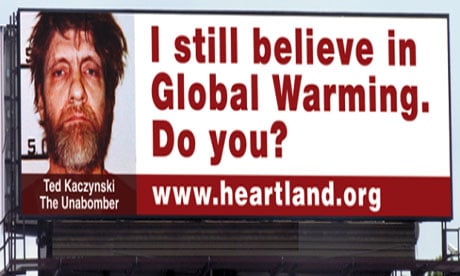“YOU have an important decision to make,” wrote Diane Bast from the conservative Heartland Institute in a memo posted to science teachers across the US last month.
“Will you tell your students the “science is settled” on global warming, as the United Nation’s Intergovernmental Panel on Climate Change (IPCC) claims it is?”
The Heartland Institute likes to ask disingenuous questions like this. Who can forget its disastrous billboard campaign of last year with that picture of terrorist and murderer Ted “Unabomber” Kaczynski and the words “I still believe in Global Warming. Do you?”
Not surprisingly, after hearing of the billboard key private sponsors and funders of Heartland pulled their support quicker than you can say “What on earth were they thinking?”
The Heartland Institute is a conservative free market “think tank” that has made the ideologically-driven denial of climate change science one its core causes. The organisation has accepted millions of dollars from the likes of Exxon, family foundations built on polluting industries and many millions more via a slush fund financed by anonymous conservative millionaires.
Diane Bast, the wife of Heartland president Joseph Bast, was writing to the science teachers to introduce the free copies of its enclosed Nongovernmental Panel on Climate Change report – Climate Change Reconsidered II.
“Like the IPCC‘s reports, NIPCC‘s reports cite thousands of articles appearing in peer-reviewed science journals relevant to the subject of human-induced climate change,” wrote Bast, who said the report was “comprehensive, objective, and faithful to the scientific method.”
Yet the report is anything but. Australian astrophysicist Dr Michael Brown, of Monash University in Melbourne, described it succinctly as “partisan pseudoscience”. Dr Brown wrote in The Conversation:
Does the NIPCC fairly and robustly assess the science? No. It is all too easy to find “debunked” papers getting a second life in latest NIPCC report.
The NIPCC report, Brown found, had a habit of citing sceptic papers which had managed to find their way into a journal without mentioning the responses to those papers, also published in the peer-reviewed literature. “Dead science lives in the NIPCC reports,” wrote Brown, adding:
It is this deliberately partisan, selective, and uncritical approach to evidence that marks the NIPCC report as a work of pseudoscience.
Steve Newton, a Programs and Policy Director at the National Center for Science Education, said he was concerned some teachers – from Kindergarten to Grade 12 – might at first glance be fooled by Heartland’s appeal. He wrote:
The danger in the Heartland Institute’s mass mailing is that some K-12 teachers may mistake what they see for real science. K-12 teachers teach a wide range of subjects in which they have variable experience and expertise. As climate science is incorporated into courses, many teachers find themselves looking for information to use in class. And here, delivered right to their mailbox, is Heartland’s report dressed up to look like a real scientific assessment from that group…what was the name, again? NIPCC? IPCC? Are they different?
Writing on the NCSE Science League of America blog, Newton said rather than being comprehensive and objective, the NIPCC offers “the tiniest slice of information possible, cherry-picked factoids out of context and without regard to the overall picture”. Newton pointed out the disingenuous nature of Diane Bast’s memo for asking teachers if they would explain to their students that “science is never settled”. Newton wrote:
To say that science can never come to any conclusions, that we can never reasonably settle any question, is to give up on the entire scientific adventure of understanding the natural world. If we can never know anything, what’s the point of investigating? This message is profoundly anti-science, and teachers should know that what Heartland and the NIPCC stand for is not some “alternative” science, but a private, alternative reality.
But this isn’t Heartland’s first attempt to push its partisan view on educators, teachers and pupils. Internal Heartland documents revealed in 2011 that the organisation wanted to pay a former coal industry consultant David Wojick to write a “global warming curriculum” for K-12 students which would focus on “controversial” aspects of the science. Heartland wrote at the time:
Heartland has tried to make material available to teachers, but has had only limited success. Principals and teachers are heavily biased toward the alarmist perspective.
Back when Heartland was putting up billboards of the Unabomber, the organisation’s president Joseph Bast wrote that “Of course, not all global warming alarmists are murderers or tyrants”. Apparently, Heartland also think some of them might be teachers too.
The organisation, like other climate science denialists, seems keen to poison classrooms with partisan and politicised propaganda.
In April, Heartland bragged it had sent 100,000 copies of a climate science denial book to “educators, business and civic leaders, judges, environmental journalists, and elected officials across the country”. Heartland also mailed a DVD aimed at school children which argued climate change was mostly caused by the sun and not emissions of greenhouse gases.
High profile Australian climate science denier, mining director and geologist Professor Ian Plimer has also targeted school children last year with his book “How To get Expelled From School: A guide to climate change for pupils, parents and punters”.
Also in Australia, the conservative Liberal National Party in the coal mining state of Queensland voted at its state convention to ban the teaching of climate change science in schools.
The proposal was put by a local doctor and party member who had also claimed to have possibly disproven the greenhouse theory in an experiment at his home using only two styrofoam boxes, a roll of plastic Glad Wrap and some bicarbonate of soda.
As far as I know, these revelations didn’t end up in the NIPCC report. Perhaps they just missed it.
Subscribe to our newsletter
Stay up to date with DeSmog news and alerts






